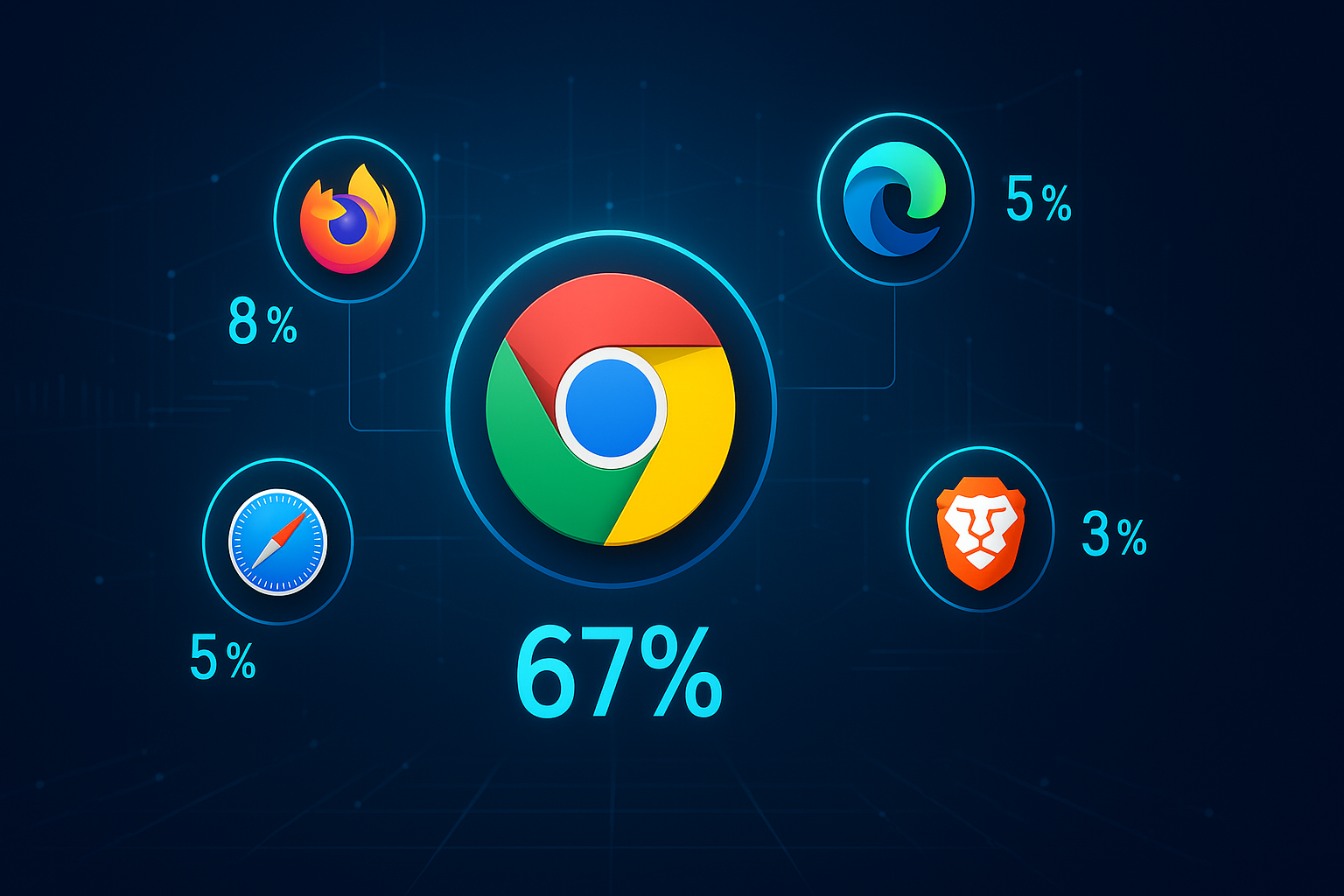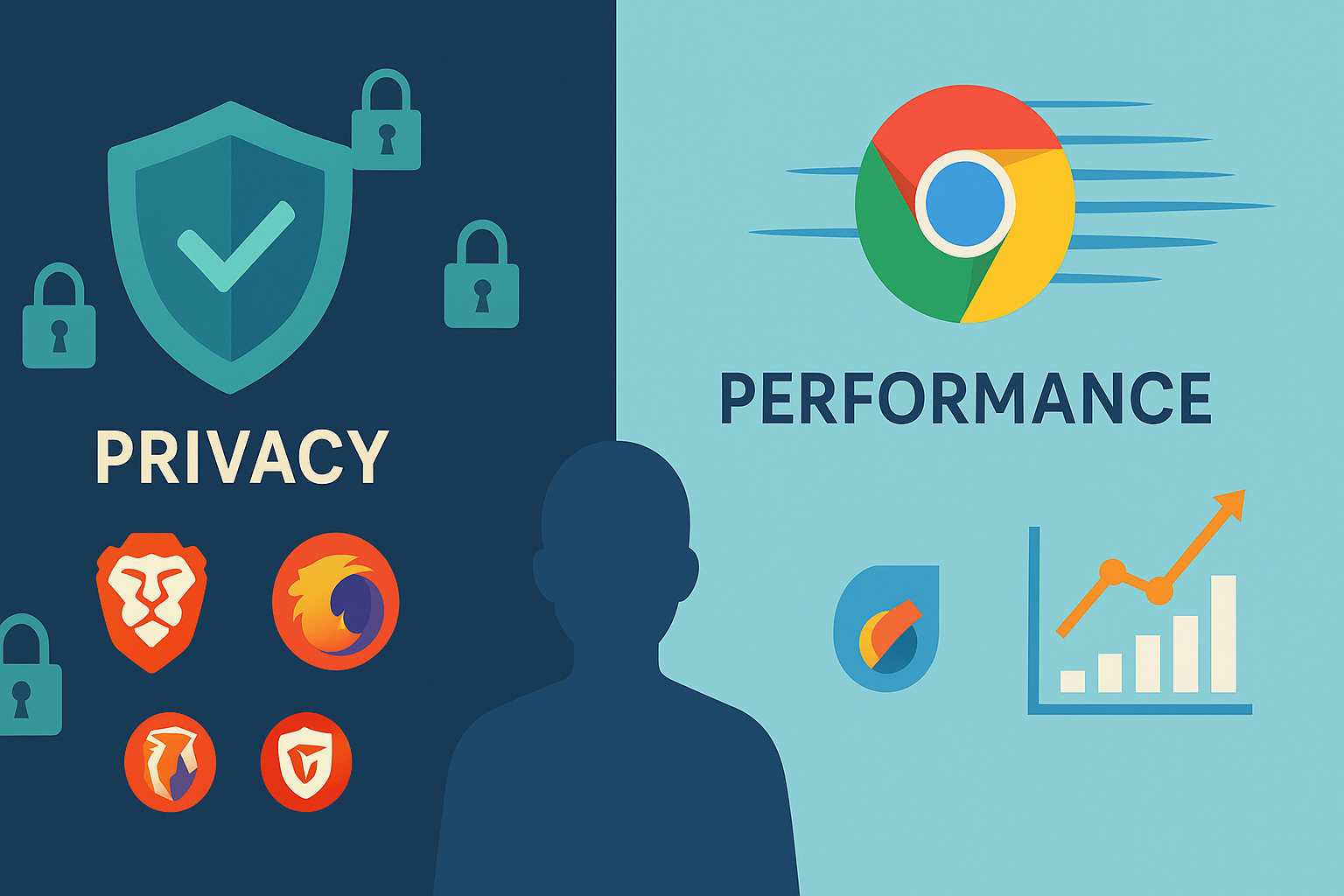
The browser market in 2025 reflects a fundamental tension between performance and privacy. While Google Chrome maintains its commanding lead with 3.69 billion users worldwide, privacy-focused browsers have seen unprecedented growth—Brave now boasts 82.7 million monthly active users (up 21.58% from 2023), and DuckDuckGo processes 3.1 billion monthly searches. This shift signals users are increasingly willing to trade some convenience for enhanced privacy protection.
The security landscape has evolved dramatically, with major browsers implementing sophisticated protections like site isolation and enhanced tracking prevention, while specialized privacy browsers offer built-in ad blocking and fingerprinting resistance. However, choosing the right browser requires understanding complex trade-offs between security features, privacy practices, performance characteristics, and real-world usability.
Current browser dominance tells a complex story
Google Chrome continues its overwhelming market dominance at 67% globally, but regional variations reveal interesting patterns. In North America, Safari claims a substantial 32.55% share due to iPhone penetration, while Chrome holds just 52%. Conversely, Chrome commands 78.25% in South America and 71.96% across Asia, highlighting how ecosystem preferences vary dramatically by geography.

Microsoft Edge has emerged as the clear third player, growing from 4.96% to 5.35% market share in 2024. Edge's enterprise-focused approach and Windows integration have helped it surpass Firefox, which has declined to just 2.57% globally despite maintaining loyal users among privacy-conscious demographics. Firefox's strongest appeal remains with users aged 35-44, who represent 11% of that age group's browser choice.
The mobile-versus-desktop divide reveals additional complexity. Mobile devices now account for 58-63% of global web traffic, with Chrome dominating mobile at 68.69% compared to Safari's 24.86%. However, desktop users spend 37-53% longer per visit, making desktop browser choice crucial for productivity and security.
Privacy browsers show remarkable growth trajectories. Brave's 21.58% year-over-year user increase and DuckDuckGo's 50+ million total downloads demonstrate that a significant user segment prioritizes privacy over market dominance. These browsers particularly appeal to male users (74.69% for Brave, 73.3% for DuckDuckGo) and those aged 25-39, suggesting privacy consciousness correlates with technical awareness.
Technical security features reveal stark differences
Modern browser security relies on sophisticated multi-layered architectures, but implementation quality varies significantly across platforms. Chrome and Edge benefit from Chromium's mature security foundation, implementing the most robust sandboxing and site isolation technologies available in 2025.
Chrome's security architecture leads in comprehensiveness. Site Isolation creates separate sandboxed processes for each website, providing protection against Spectre and Meltdown vulnerabilities while increasing memory usage by 10-20%. Safe Browsing with Enhanced Safe Browsing mode offers real-time phishing protection with 25% more warnings shown, using machine learning to detect emerging threats. However, Chrome's security comes at a cost—over 50 critical vulnerabilities were reported in 2024, including actively exploited zero-days like CVE-2024-7971 and CVE-2024-7965.
Microsoft Edge combines Chromium's security with Microsoft-specific enhancements. Enhanced Security Mode disables JIT JavaScript compilation on unfamiliar sites, reducing memory-related vulnerabilities while maintaining performance on trusted domains. Microsoft Defender SmartScreen provides real-time reputation checks integrated with Microsoft's threat intelligence. However, Edge inherits Chromium's vulnerability burden while adding Microsoft-specific attack surfaces.
Firefox offers independent security architecture with unique strengths and limitations. Enhanced Tracking Protection blocks social media trackers and cross-site cookies by default, while DNS over HTTPS encrypts DNS queries to prevent eavesdropping. Firefox's Fission site isolation implementation is catching up to Chromium but remains less mature. The browser's independent development provides diversification benefits—different bugs, different attack vectors—but weaker sandboxing compared to Chromium-based alternatives limits its security ceiling.
Brave inherits Chromium's security while adding privacy-focused enhancements. Built-in Shields block trackers and ads by default, while fingerprinting protection uses randomization to prevent cross-site tracking identification. Brave's HTTPS Everywhere implementation and Tor integration for private browsing provide additional security layers without requiring extensions.
Brave browser represents privacy-first design philosophy
Brave has emerged as the most compelling privacy-focused mainstream browser, growing to 82.7 million monthly active users through aggressive default protections and innovative monetization. Brave Shields block more trackers than any other mainstream browser by default, using EasyList, EasyPrivacy, and uBlock Origin filter lists with aggressive and standard blocking modes.
The browser's fingerprinting protection employs sophisticated randomization techniques, implementing per-session, per-site randomization seeds that prevent cross-site tracking while maintaining website compatibility. This "farbling" technology represents a significant advancement over simple fingerprinting blocking, which often breaks website functionality.
Brave's Basic Attention Token (BAT) system offers privacy-respecting advertising. Users can opt-in to view ads and earn BAT tokens, with ad matching happening locally on-device without sending personal data to Brave's servers. This approach generates revenue while maintaining privacy—tokens can support content creators or be converted to cash. The system processed over 800,000 iPhone downloads in January 2024 alone, indicating strong user acceptance.
Brave's technical implementation includes CNAME uncloaking to detect hidden trackers, ephemeral third-party storage partitioning, and automatic HTTPS upgrades. The browser integrates Tor for private browsing, providing anonymity capabilities without requiring separate software. However, Brave's dependence on Chromium means it inherits security vulnerabilities from that codebase, and its smaller user base limits threat intelligence compared to mainstream browsers.
Privacy-focused alternatives offer specialized protections
Beyond Brave, several browsers target specific privacy use cases with varying approaches to user protection and anonymity.
DuckDuckGo Browser emphasizes simplicity with comprehensive tracker blocking. The browser blocks trackers from 85% of popular websites by default, automatically handles cookie consent pop-ups, and provides Global Privacy Control signaling. Its 3.1 billion monthly searches and 50+ million total downloads demonstrate significant market adoption. However, DuckDuckGo's 2022 controversy revealed Microsoft tracker exceptions due to search syndication agreements, highlighting the complexity of privacy implementations even among privacy-focused products.
Tor Browser prioritizes anonymity over convenience. Onion routing through multiple encrypted layers provides strong anonymity protection, while aggressive security settings block JavaScript and plugins that could reveal user identity. Three security levels—Standard, Safer, and Safest—allow users to balance anonymity with functionality. However, significantly slower browsing speeds, limited website compatibility, and exit node vulnerabilities make Tor unsuitable for everyday browsing for most users.
Specialized privacy browsers fill niche needs. Ungoogled Chromium removes all Google services from Chromium but requires manual updates and technical knowledge. LibreWolf provides a hardened Firefox fork with telemetry and Mozilla services removed, offering frequent releases within three days of Firefox updates. These browsers serve technically sophisticated users willing to sacrifice convenience for maximum privacy control.
Data collection practices reveal fundamental business model differences
The extent and nature of data collection varies dramatically across browsers, reflecting their underlying business models and revenue sources. Understanding these practices is crucial for users making informed privacy decisions.

Google Chrome's data collection reflects its advertising-dependent business model. When users sign in, Chrome syncs browsing history, bookmarks, passwords, and preferences across devices. Every URL typed in the address bar is sent to Google services, search autocomplete sends web addresses in real-time, and Chrome scans entire computers to report executable program hashes for Safe Browsing. Google's Web & App Activity setting tracks granular details including location data, websites visited, and app usage patterns.
Microsoft Edge collects extensive diagnostic data that cannot be fully disabled. Required diagnostic data includes device connectivity, configuration, and app version information. Optional diagnostic data encompasses usage patterns, websites visited, and crash reports. Academic research from Trinity College Dublin found Edge among the least private browsers, sending persistent identifiers that enable long-term tracking even when privacy settings are adjusted.
Mozilla Firefox takes a more transparent approach to data collection. Telemetry collects technical and interaction data by default but can be completely disabled. Firefox's revenue model relies primarily on search engine partnerships—Google pays approximately $400 million annually—rather than user data monetization. Telemetry data is retained for 13 months and deleted within 30 days of opt-out, providing clearer data lifecycle management.
Privacy-focused browsers minimize data collection by design. Brave collects minimal anonymous usage statistics without personal data, while DuckDuckGo doesn't store search history or share user data with third parties. Tor Browser collects no data and stores nothing between sessions. These approaches demonstrate that functional browsers can operate without extensive user surveillance.
Performance comparisons reveal complex trade-offs
Browser performance encompasses multiple dimensions—speed, resource usage, battery life, and functionality—with different browsers excelling in different areas based on their architectural choices and optimization priorities.
Google Chrome leads in raw performance metrics, scoring 134-197 runs per minute on Speedometer 3.0 benchmarks and delivering top JavaScript execution speeds. Chrome provides 3-4 minutes faster loading times on complex sites compared to competitors. However, this performance comes at a significant resource cost—Chrome consumes 1,100-1,783MB of RAM with five tabs open, compared to Vivaldi's efficient 543MB usage.
Microsoft Edge offers the best performance-to-efficiency ratio, scoring 185-197 runs per minute on Speedometer while consuming 9% less energy than Chrome. Edge delivers 9 hours 12 minutes of laptop battery life compared to Chrome's 9 hours 8 minutes, making it ideal for mobile productivity scenarios.
Safari excels on Apple hardware through platform optimization. While scoring 141 runs per minute on cross-platform benchmarks, Safari leads in graphics performance and energy efficiency on macOS and iOS devices. Safari's integration with Apple's hardware provides advantages that generic browsers cannot match.
Privacy-focused browsers sacrifice some performance for protection. Firefox consistently ranks last in speed benchmarks at 130-160 runs per minute but compensates with excellent privacy features and customization options. Brave maintains good performance while providing built-in privacy protections, and notably delivers 40% better battery life than Chrome, Firefox, or Edge on mobile devices.
Memory efficiency varies significantly across browsers. Vivaldi leads at 543MB for five tabs, followed by Edge at 792MB and Firefox at 847MB. Chrome's high memory usage reflects its aggressive pre-loading and site isolation security features—a conscious trade-off between performance and resource consumption.
Enterprise security demands specialized browser solutions
Enterprise browser requirements differ fundamentally from consumer needs, emphasizing security controls, policy management, and compliance capabilities over individual privacy protections.
Chrome Enterprise Premium leads enterprise adoption with a 4.6/5 rating from 317 organizational reviews. Advanced context-aware access controls, robust Data Loss Prevention (DLP), and Zero Trust integration serve over 1,000 organizations. Chrome Enterprise's maturity and extensive security research make it attractive for large-scale deployments despite privacy concerns.
Island Enterprise Browser achieves highest user satisfaction with a 4.9/5 rating from 178 reviews and a $4.8 billion valuation reflecting market confidence. Island's native security workflow integration and specialized enterprise features address specific organizational security requirements that general-purpose browsers cannot match.
Microsoft Edge for Business provides seamless ecosystem integration with AI-powered Copilot features and Microsoft 365/Windows 11 connectivity. Enterprise-grade security features and familiar Microsoft management tools appeal to organizations already invested in Microsoft infrastructure.
Enterprise browser security emphasizes different priorities than consumer protection—preventing data exfiltration, managing user access, and maintaining compliance often matter more than blocking advertising trackers or preventing behavioral profiling.
Emerging trends reshape browser development priorities
The browser landscape in 2025 reflects several converging trends that will define future development: privacy regulation enforcement, AI integration challenges, and the ongoing deprecation of third-party cookies.
Third-party cookie deprecation continues with user-choice approaches. Google abandoned complete third-party cookie elimination, instead implementing user-choice interfaces allowing global cookie acceptance or rejection. Safari already blocks third-party cookies by default through Intelligent Tracking Prevention, while Firefox's Enhanced Tracking Protection blocks known trackers. This fragmented approach creates complexity for websites and varying user experiences across browsers.
AI integration raises new privacy concerns. Chrome and Edge lead in AI feature integration, but these capabilities often require sending user data to cloud services for processing. Privacy-focused browsers face challenges incorporating AI features without compromising their core privacy principles.
Enterprise browser security emerges as distinct market segment. Specialized solutions like Island and Talon (acquired by Palo Alto Networks) address enterprise needs that general-purpose browsers cannot meet. This trend suggests browser development may increasingly bifurcate between consumer privacy focus and enterprise security specialization.
Mobile-first internet usage patterns influence desktop browser development. With 58-63% of web traffic originating from mobile devices, browser developers must balance mobile optimization with desktop functionality, often leading to feature compromises across platforms.
Choosing the right browser for specific needs
Browser selection should align with individual use cases, security requirements, and privacy preferences rather than following market share dominance or marketing claims.
For privacy-conscious users seeking maximum protection: Firefox with hardened settings or Brave provide the strongest built-in privacy protections. Firefox offers extensive customization and open-source transparency, while Brave delivers privacy features without requiring configuration expertise. Both block tracking by default and provide strong fingerprinting resistance.
For performance-focused users prioritizing speed: Google Chrome delivers the fastest overall browsing experience with superior JavaScript execution and graphics performance. Users willing to accept higher resource usage and privacy trade-offs benefit from Chrome's speed advantages, extensive extension ecosystem, and rapid security updates.
For battery life and efficiency optimization: Microsoft Edge provides the best balance of performance and energy consumption, delivering 9% better efficiency than Chrome while maintaining competitive speed. Edge's 9 hours 12 minutes of laptop battery life makes it ideal for mobile productivity scenarios.
For enterprise environments requiring security controls: Chrome Enterprise Premium offers the most mature platform with advanced DLP and access controls, while Island provides specialized enterprise security features. Microsoft Edge for Business appeals to organizations invested in Microsoft infrastructure.
For Apple ecosystem users: Safari provides optimal integration with macOS and iOS devices, superior energy efficiency on Apple hardware, and strong default privacy protections. Safari's platform optimization delivers advantages that cross-platform browsers cannot match.
For developers and technical users: Chrome's superior DevTools combined with Firefox for cross-browser testing provides comprehensive development capabilities. Chrome extensions and debugging features surpass other browsers for development workflows.
Best practices transcend browser choice
Regardless of browser selection, certain practices significantly improve security and privacy protection across all platforms and use cases.
Configure privacy settings aggressively. Disable unnecessary telemetry, location services, and auto-fill features. Enable Enhanced Tracking Protection in Firefox, configure Chrome's Enhanced Safe Browsing, or activate Brave Shields appropriately. Most browsers default to convenience over privacy—users must actively adjust settings.
Maintain updated browsers and operating systems. Security vulnerabilities are discovered constantly—Chrome reported over 50 critical vulnerabilities in 2024 alone. Automatic updates prevent exploitation of known vulnerabilities, while delaying updates increases exposure to active threats.
Use password managers instead of browser password storage. Dedicated password managers like Bitwarden, 1Password, or KeePass provide superior security compared to browser-integrated password storage. They work across browsers and applications while providing better encryption and access controls.
Implement layered security approaches. No single browser provides complete protection—combine browser security with VPN services for network protection, ad blockers for additional tracking prevention, and firewall software for network monitoring. Consider using different browsers for different activities—privacy browsers for sensitive tasks, mainstream browsers for compatibility-dependent activities.
Regularly audit and clean browser data. Periodically clear cookies, cached data, and browsing history. Review and remove unnecessary extensions, which often provide additional attack surfaces. Configure automatic data clearing on browser closure for sensitive browsing sessions.
The browser security landscape in 2025 offers unprecedented choice and capability, but also requires users to make informed decisions about complex trade-offs between privacy, security, performance, and functionality. Understanding these dynamics enables better protection against evolving digital threats while maintaining practical browsing capabilities.
https://ift.tt/hS8Olz0
https://ift.tt/UhfSoTk
https://guptadeepak.com/content/images/2025/06/Browser-Security-Landscape-2025-guptadeepak.com.png
https://guptadeepak.weebly.com/deepak-gupta/browser-security-landscape-transformed-in-2025


No comments:
Post a Comment